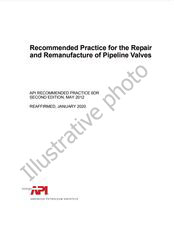We need your consent to use the individual data so that you can see information about your interests, among other things. Click "OK" to give your consent.

API STD 530-ed.7
Calculation of Heater-tube Thickness in Petroleum Refineries
Translate name
STANDARD published on 1.12.2021
The information about the standard:
Designation standards: API STD 530-ed.7
Publication date standards: 1.12.2021
SKU: NS-1140505
The number of pages: 322
Approximate weight : 997 g (2.20 lbs)
Country: American technical standard
Category: Technical standards API
Annotation of standard text API STD 530-ed.7 :
API STD 530, 7th Edition, April 2015 - Calculation of Heater-tube Thickness in Petroleum Refineries
This standard specifies the requirements and gives recommendations for the procedures and design criteria used for calculating the required wall thickness of new tubes and associated component fittings for fired heaters for the petroleum, petrochemical, and natural gas industries. These procedures are appropriate for designing tubes for service in both corrosive and noncorrosive applications. These procedures have been developed specifically for the design of refinery and related fired heater tubes (direct-fired, heat-absorbing tubes within enclosures). These procedures are not intended to be used for the design of external piping.
This standard does not give recommendations for tube retirement thickness; Annex A describes a technique for estimating the life remaining for a heater tube.
We recommend:
Technical standards updating
Do you want to make sure you use only the valid technical standards?
We can offer you a solution which will provide you a monthly overview concerning the updating of standards which you use.
Would you like to know more? Look at this page.



 Cookies
Cookies
